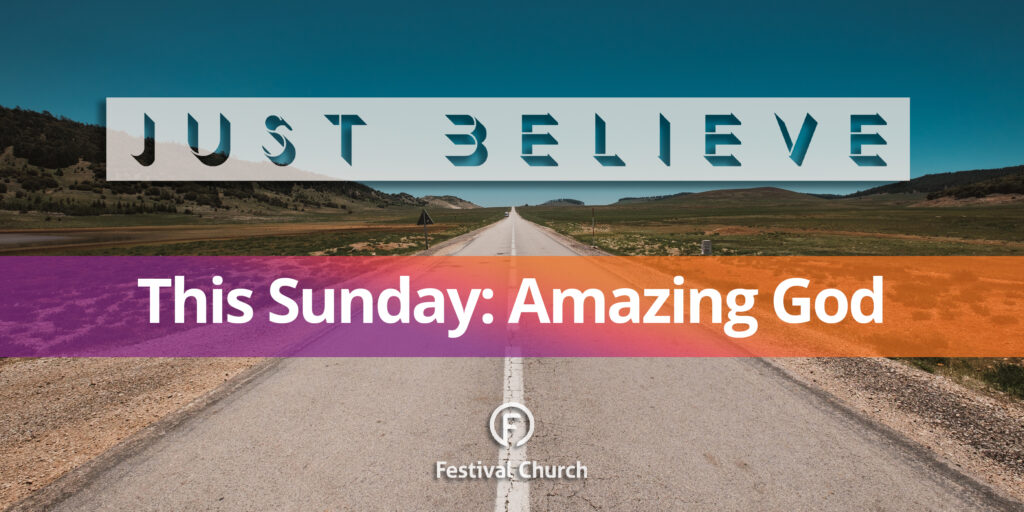Just Believe – Spirit Power
Spirit Power
Jesus answered, “The work of God is this: to believe in the one he has sent.”John 6:29
‘Believe’ is a theme of John’s, mentioning it in his gospel 99 times.
‘to believe’ in Jesus is about relationship, and another way of translating ‘to believe’ is ‘entrusting oneself to’
Entrust = ‘to put into the care or protection of someone’
On the last day, the climax of the festival, Jesus stood and shouted to the crowds, “Anyone who is thirsty may come to me! Anyone who believes in me may come and drink! For the Scriptures declare, ‘Rivers of living water will flow from his heart.’” John 7:37-39 (NLT)
Feast of Tabernacles
To appreciate the impact of Jesus’ promise we need to understand the first-century water-pouring ritual during this feast. Priest would walk with golden containers to fetch water from stream of Silioah. With much pomp and ceremony they would take the containers back to the temple and pour the water on the altar.
So ecstatic was the joy with which this ceremony was performed—accompanied with sound of trumpets—that it used to be said, “Whoever had not witnessed it had never seen rejoicing at all” Lightfoot
Then the words of Is 12:3 (NIV) were sung, With joy you will draw water from the wells of salvation and thus the symbolical reference of this act, intimated in Jn 7:39, was expressed”.
Thirst is your body’s way of telling you that it’s running low on water, which it needs to work well.
As the deer longs for streams of water, so I long for you, O God.
I thirst for God, the living God. When can I go and stand before him?Psalm 42:1-2 (NLT)
What things can you put in place to thirst for God?
In John 6 – Jesus talks about himself as bread of life, now he is talking about living water, not only is Jesus our life’s longing fulfilled, he is also the ongoing source of life’s energy and renewal.
On the last day, the climax of the festival, Jesus stood and shouted to the crowds, “Anyone who is thirsty may come to me! Anyone who believes in me may come and drink! For the Scriptures declare, ‘Rivers of living water will flow from his heart.’”
(When he said “living water,” he was speaking of the Spirit, who would be given to everyone believing in him. But the Spirit had not yet been given, because Jesus had not yet entered into his glory.)John 7:37-39 (NLT)
John gives an explanation to what Jesus meant. John mentions the Spirit had not yet been given but if we continue reading the Bible we find that the Spirit was given in Acts 2 on the day of Pentectost.
Pentecost
Pentecost was a festival that was celebrated 50 days after the Passover. Significant for us, Pentecost was 50 days after Jesus was killed. Pentecost is the culmination of the Easter story. Death, Burial, resurrection, Ascension and Pentecost. Some even call Pentecost the birth of the church.
On the day of Pentecost[a] all the believers were meeting together in one place. 2 Suddenly, there was a sound from heaven like the roaring of a mighty windstorm, and it filled the house where they were sitting. 3 Then, what looked like flames or tongues of fire appeared and settled on each of them. 4 And everyone present was filled with the Holy Spirit and began speaking in other languages,[b] as the Holy Spirit gave them this ability.
5 At that time there were devout Jews from every nation living in Jerusalem. 6 When they heard the loud noise, everyone came running, and they were bewildered to hear their own languages being spoken by the believers.
7 They were completely amazed. “How can this be?” they exclaimed. “These people are all from Galilee, 8 and yet we hear them speaking in our own native languages! 9 Here we are—Parthians, Medes, Elamites, people from Mesopotamia, Judea, Cappadocia, Pontus, the province of Asia, 10 Phrygia, Pamphylia, Egypt, and the areas of Libya around Cyrene, visitors from Rome 11 (both Jews and converts to Judaism), Cretans, and Arabs. And we all hear these people speaking in our own languages about the wonderful things God has done!” 12 They stood there amazed and perplexed. “What can this mean?” they asked each other.
13 But others in the crowd ridiculed them, saying, “They’re just drunk, that’s all!”
14 Then Peter stepped forward … Acts 2:1-13 (NLT)
Peter goes on to explain that this is prophecy from Joel, share the gospel and people ask what they must do to respond. Repent and be baptised. 3000 were added to the church.
The three promises from the Pentecost
1. Clothed with Power
I am going to send you what my Father has promised; but stay in the city until you have been clothed with power from on high.”Luke 24:49 (NIV)
This promise is consistent with the initial commissioning of the Twelve by Jesus (Luke 9:1–6). Having called the Twelve together, Jesus “gave them power and authority over all the demons and to heal diseases” (9:1). Through the exercise of this power the disciples became partners with Jesus in manifesting the kingdom of God—liberating captives from their bondage to the spirit world and restoring many others to health. The disciples, undoubtedly, would have understood this latter promise in the light of their earlier commissioning. They also would have associated this promise of power with that display of power that had characterized the ministry of Jesus (Luke 4:14).
Stronstad, Roger. The Charismatic Theology of St. Luke: Trajectories from the Old Testament to Luke-Acts (Kindle Locations 1217-1222). Baker Publishing Group. Kindle Edition.
2. Baptized with the Holy Spirit
For John baptized with water, but in a few days you will be baptized with the Holy Spirit.”Acts 1:5 (NIV)
Luke parallels the Spirit baptism of the disciples with the inaugural anointing of Jesus by the Holy Spirit. In his book Literary Patterns, Theological Themes, and the Genre of Luke-Acts , Charles Talbert outlines Luke’s fourfold parallelism between the two episodes: (1) both Jesus and the disciples are praying, (2) the Spirit descends after their prayers, (3) there is a physical manifestation of the Spirit, and (4) the ministries of both Jesus and the disciples begin with a sermon that is thematic of what follows, appeals to the fulfillment of prophecy, and speaks of the rejection of Jesus. [87] This parallelism points to the functional equivalence between the two events. Therefore, since the gift of the Spirit to Jesus inaugurates and empowers his mission, then, whatever meaning Spirit baptism might have in other contexts, it has the same primary charismatic meaning for the mission of the disciples as the anointing by the Spirit had for the charismatic mission of Jesus.
Stronstad, Roger. The Charismatic Theology of St. Luke: Trajectories from the Old Testament to Luke-Acts (Kindle Locations 1232-1240). Baker Publishing Group. Kindle Edition.
3. Receive Power
But you will receive power when the Holy Spirit comes on you; and you will be my witnesses in Jerusalem, and in all Judea and Samaria, and to the ends of the earth.”Acts 1:8 (NIV)
This promise also reveals the purpose of the gift of the Spirit: it is for witness. The particular content of this witness is to be the disciples’ attestation to the resurrection of Jesus (Acts 1:22), which, beginning with Peter’s Pentecost address, characterizes the preaching of Acts (2:22–36; 3:15; 4:10, 33; etc.). The gift of the Spirit is thus an equipping of the disciples for service.
Stronstad, Roger. The Charismatic Theology of St. Luke: Trajectories from the Old Testament to Luke-Acts (Kindle Locations 1243-1246). Baker Publishing Group. Kindle Edition.




